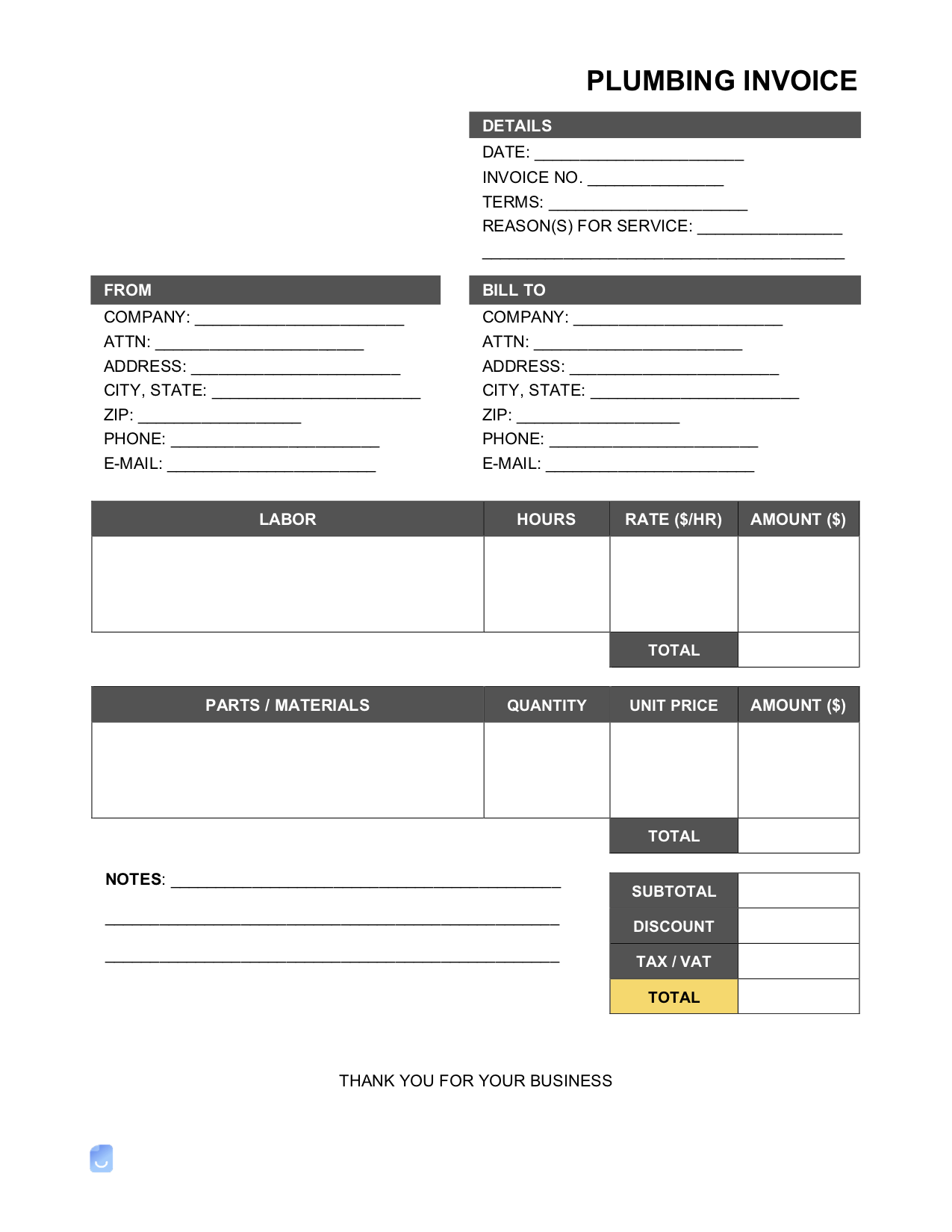Plumbing Invoice Template
A plumbing invoice is for part-time and career plumbers who provide services on an hourly or upfront basis to both commercial and residential customers. For plumbers, sending an invoice electronically allows for increased organization, accessibility, and professionalism, as well as a faster means of receiving payment from customers.
What Do Plumbers Do?
Plumbers are experts in the maintenance and installation of piping systems, fittings, and fixtures in both residential and commercial settings. The nature of plumbing work may lead plumbers to weld or do carpentry, resulting in many plumbers having adept knowledge in a wide variety of tools and topics. For residential plumbers, work is often requested on short notice due to water or heating emergencies requiring an immediate fix. The impulsivity of the profession allows for higher rates to be charged, resulting in plumbers having some of the highest salaries in the construction industry.
- Work Environment: Residential homes, industrial settings, commercial properties. Requires fitting into confined spaces and working in hot or cold climates.
- Common Duties: Repair broken fixtures, mend leaking or broken pipes, pressure test piping, assemble a wide assortment of tools and fixtures, troubleshoot complex issues, give pricing estimates, read blueprints, and removing clogged drains and pipes.
Plumber vs. Handyman
The term “handyman” is a general term to describe a person that works with their hands and is typically hired to do a wide variety of jobs around a home that is not (typically) very complicated but is not necessarily obvious at the same time. A handyman does not need to hold any licenses by the state, which makes their services cheaper, but also less trustworthy. Plumbers, on the other hand, are licensed and have gone through years of formal training. While the average plumber’s hourly rate will be much higher than that of a handyman, the knowledge that the job is in the hands of a professional is often worth the increased price.
How to Get a Plumbing License
Before earning a license to perform plumbing services, prospective plumbers need to be accepted into an apprenticeship, which can take anywhere from four (4) to five (5) years to complete. As is often the case, many people may be bidding for a single apprenticeship, only selecting those with the most impressive resume and technical experience. To impress those that hire for apprenticeships, candidates should enroll in technical classes, which can be found in almost any community college, technical school, or trade school. Depending on the state in which the aspiring plumber is looking to be licensed, there are varying levels of certificates and requirements. Some states require apprentices to apply for licensing before being permitted to work under a qualified plumber. Other states have licenses that start at the “Journeyman” level, which is the title of a plumber capable of performing plumbing work for a small business, for a contracting company, or as a freelancer. The designation for a plumber with substantial experience is the “Master Plumber.” Depending on the state, earning the master plumber title can require working as a journeyman for several years or just passing an official test. For a complete breakdown of each state’s plumber licensing requirements, check out Next Insurance’s Comprehensive Guide.
Plumber Salary & Hourly Rate ($/hr)
Journeyman (source: Glassdoor, PayScale)
- Salary: $70,343/yr
- Hourly Rate: $25.86/hr
Master Plumber (source: Glassdoor, PayScale)
- Salary: $80,322/yr
- Hourly Rate: $29.41/hr
